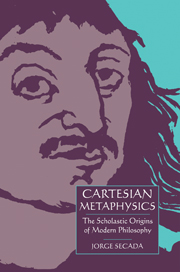Book contents
- Frontmatter
- Contents
- Preface
- Abbreviations
- Prologue
- Part I The unity of Cartesian metaphysics
- Part II Ideas and the road from essence to existence
- Part III Cartesian substances
- 7 The substantial tension
- 8 The essence and the existence of Cartesian substances
- 9 The real distinction or the body and the minds
- Epilogue
- Notes
- References
- Index
9 - The real distinction or the body and the minds
Published online by Cambridge University Press: 22 September 2009
- Frontmatter
- Contents
- Preface
- Abbreviations
- Prologue
- Part I The unity of Cartesian metaphysics
- Part II Ideas and the road from essence to existence
- Part III Cartesian substances
- 7 The substantial tension
- 8 The essence and the existence of Cartesian substances
- 9 The real distinction or the body and the minds
- Epilogue
- Notes
- References
- Index
Summary
The body and the minds
In the last two chapters we have examined Descartes's doctrine of substance, its essence and its existence. Cartesian substances are subjects that bear their properties as determinables are determined by their determinates. A Cartesian essence is one property, an intelligible whole which constitutes and individuates its substance, and is itself distinct in the manner of a highest-order determinable. Hence, each one of the real properties inhering in a substance serves to individuate its subject in a purely intelligible way and without reference to extrinsic, trivially individuating properties. The existence of a substance is a second-order or derivative property which consists solely in something being that essence, and which adds nothing beyond the reality of the essence. Now we move from these general metaphysical doctrines to Descartes's ontology, from the pure theory to its application. In this chapter we will consider the Cartesian account of what there actually is, of us and the world around us.
When commentators write about Descartes's real distinction, they usually refer to the distinction between the human body and the human mind. However, a real distinction holds between any two substances; and though Descartes did believe that a human mind is a substance, he took the human body to be a modified or determined part of the single corporeal substance.
- Type
- Chapter
- Information
- Cartesian MetaphysicsThe Scholastic Origins of Modern Philosophy, pp. 236 - 264Publisher: Cambridge University PressPrint publication year: 2000



